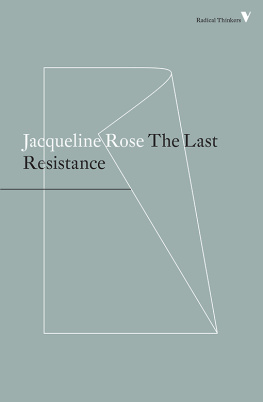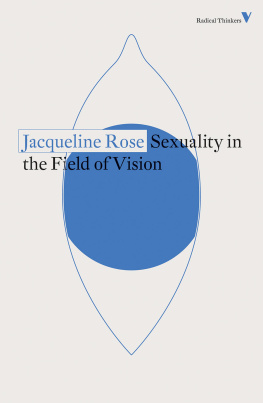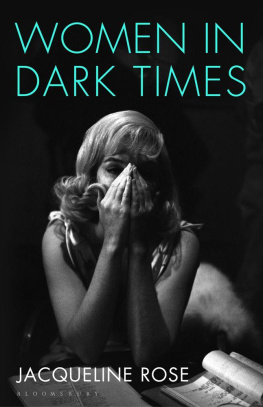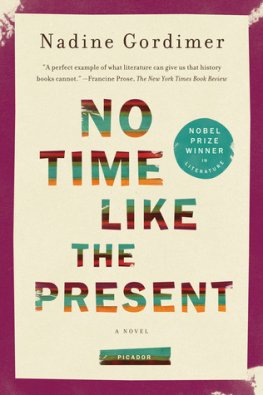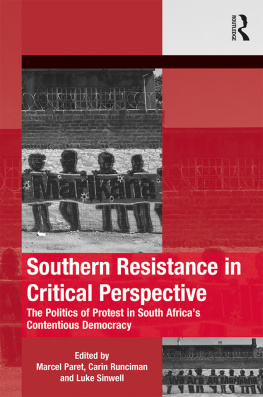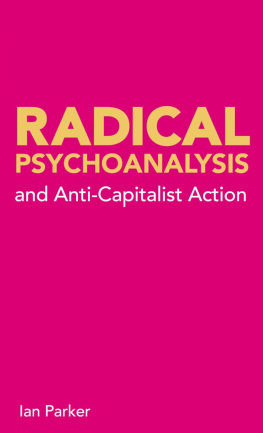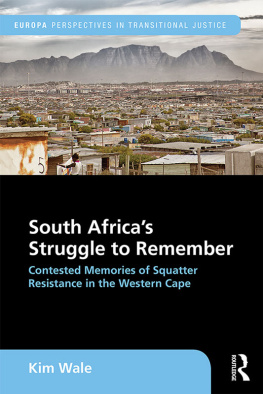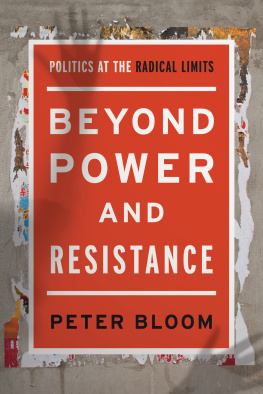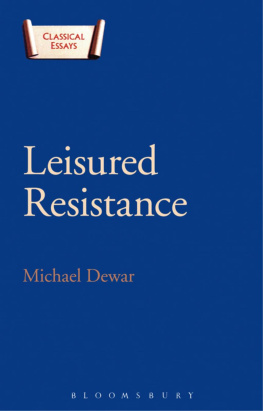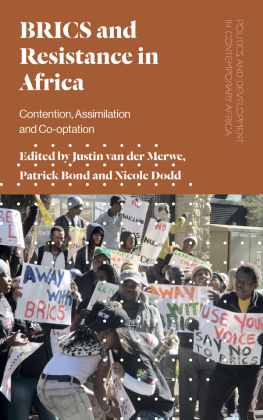The Last Resistance

JACQUELINE ROSE

This edition published by Verso 2017
First published by Verso 2007
Jacqueline Rose 2007, 2013, 2017
All rights reserved
The moral rights of the author have been asserted
1 3 5 7 9 10 8 6 4 2
Verso
UK: 6 Meard Street, London W1F 0EG
US: 20 Jay Street, Suite 1010, Brooklyn, NY 11201
versobooks.com
Verso is the imprint of New Left Books
ISBN-13: 978-1-78663-075-9
ISBN-13: 978-1-78663-076-6 (UK EBK)
ISBN-13: 978-1-78663-077-3 (US EBK)
British Library Cataloguing in Publication Data
A catalogue record for this book is available from the British Library
Library of Congress Cataloging-in-Publication Data
A catalog record for this book is available from the Library of Congress
Typeset in Bembo by Hewer Text UK Ltd, Edinburgh
Printed in the US by Maple Press
for Ronit and Asher Tlalim
The man who is the possessor of force seems to walk through a non-resistant element; in the human substance that surrounds him nothing has the power to interpose, between the impulse and the act, the tiny interval that is reflection.
Simone Weil, The Iliad, or the Poem of Force, 1940
The inner world meets with a two-fold resistance; on the one hand, the incapacity to understand it, and on the other, a direct emotional rejection of it as unwelcome suggestion which is hardly rationalised by serious discussion.
Joan Rivire, The unconscious phantasy of an
inner world reflected in examples of literature, 1952
Contents
These essays were all written post-11 September and in the shadow of the worsening conflict in IsraelPalestine. They are published in the year that Israels occupation of the West Bank and Gaza reaches its fortieth anniversary, an occupation that has now lasted longer in Israels history than the period between the Declaration of Independence of 1948 that founded the state and the 1967 war which was when it begun. This has also been the time when Americas plans for a new century have led to the maelstrom of Iraq. An illegal war, to which Great Britain is shamefully a party, and one of the longest occupations of modern history form the sombre backdrop to this book.
In this context two discourses or ways of thought make their mark, as they always have for me, against the darkness of the times. One is psychoanalysis, in its ability to uncover truths that would remain hidden, and to unsettle the most rigid forms of identity as they play themselves out across the stage of political life. The other is literature whose power to subvert the status quo receives new urgency when the dominant clichs and deceptions of statehood, whether here and in the US or in Israel, have reached such new and mind-numbing heights. Both psychoanalysis and literature appear in these essays as forms of resistance, which is the term that gives its title to the book. Resistance has of course another history, most famously in the struggle against the Nazis, whose genocide of European Jewry was the prelude to the founding of the Jewish state. It is one of the tragedies of the history examined in these pages that the nation intended to protect the Jewish people has become the agent of state violence against another people, the Palestinians, who find themselves engaged today in a resistance of their own. These forms of resistance are not the same, any more than what, or whom, they are fighting against. Across the world, resistance shifts its meanings and location. Whole destinies, only some of them touched on here, are contained in the mutations of this word.
The writers who people these essays my travelling companions as I like to think of them all open up the space of critical thought. They allow me, as I hope they will allow the reader, to think against the grim orthodoxies of our times.
Originally, these pieces had different audiences and destinations. The less formal, non-academic essays I have chosen to keep to their original format without notes.
I am enormously grateful to the London Review of Books, where a number of the essays were originally published, in particular, once again, to Mary-Kay Wilmers. Thanks also to Adam Shatz at The Nation, to Alex Scrimgeour at Harpers magazine, to Derek Johns, and to Tom Penn at Verso where I am delighted to be published once again. Other people have been of immense importance over the period the essays were written. I cannot now imagine writing without the support and insights of Sally Alexander and Marina Warner. Avi Shlaim brings his exemplary scholarship and clarity to everything he reads. I owe a special debt to the thoughts of scholar of Tibetan culture Ronit Tlalim, and to the dynamic creativity of filmmaker Asher Tlalim, new friends to whom, with much appreciation, I dedicate this book. And to Jonathan Sklar who reads me with such profound care. Queen Mary, University of London has continued to provide a free space of intellectual enquiry and unfailing support. The students of the course I have been teaching there over the past two years PalestineIsrael, IsraelPalestine: Politics and the Literary Imagination have played a crucial role. I thank them. Finally, the strongest thanks are due to my daughter, Mia Rose, who continues to be the most vital presence of all, and the source of much joy.
At a key moment in Irne Nmirovskys Suite Franaise, Lucile Angellier walks into the garden towards Bruno, the German soldier billeted in her house since the Occupation of France, with whom she has fallen in love. She has burdened her desire for him with the meaning of freedom. Not the superficial freedom to travel or leave her house, even though that would be unimaginably blissful, but freedom of the mind: Id rather feel free inside to choose my own path, never to waver, not to follow the swarm. I hate this community spirit they go on and on about. Her illicit love will free her from a loveless marriage (her husband, who has kept a mistress for most of their married life, is at the front), from the grip of a cruelly vigilant mother-in-law, and, even more startling in the context of the Occupation, from the crowd the community spirit pounded into her ears (cet esprit communautaire dont on nous rabat les oreilles). Lucile is resisting conformity, even if that means consorting with the enemy, even if it means rejecting the ethos of her community as it struggles to maintain its dignity and survive. In Occupied France, this is of course to turn the meaning of resistance on its head. For a moment, resistance degrades itself, descends a rung into vulgarity (as in will she resist his charms?). But when the long-awaited encounter takes place, something erupts inside Lucile and she pushes Bruno away: No, never! she cried out. Never! Never would she be his. She was afraid of him. She no longer craved his touch. She wasnt depraved enough (or too young perhaps) to allow her fear to be transformed into desire. At the final hour, resistance is spared contamination although to say it is a close thing is an understatement. They were enemies in spite of everything, and what made them so were the secret movements of blood they had counted on to unite them and over which they were powerless.
Resistance is the term that gives its title to these essays. For Nmirovsky, at this crisis point in the novel, it is the blood that resists, halting Eros in its tracks as it tries its chance across enemy lines. A tinge of racial fantasy in her language does not detract from her genius in condensing into such a brief passage the strange permutations of resistance in our time. Resisting Bruno, Lucile becomes a true daughter of her nation, united with her captive land, although once more a prisoner, gagged and bound (she sacrifices her freedom in identification with Frances darkest hour). At huge risk to herself, she will go on to protect a young Frenchman on the run after he has shot a German soldier. For many, resistance, as Resistance to Nazism, can only bear this meaning only in that form does the term have its capital R: a word husbanded by history, sacred, eternally sequestered, whose meanings are exhausted by the moments of bravery and cunning of the Second World War. This word, Jacques Derrida writes, which first resonated in my desire and imagination as the most beautiful word in the politics and history of this country [] charged with all the pathos of my nostalgia, as if what I would have wanted not to miss at any cost would have been to blow up trains, tanks and headquarters between 1940 and 1945.

